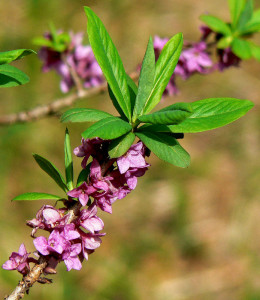Mezereum, commonly known as February daphne, mezereon, Daphne mezereum, spurge laurel or spurge olive, is native to most of Europe and Western Asia, north to northern Scandinavia and Russia.
Contents
Uses
- Mezereum is a shrub. Historically, its bark was used to make medicine. But Mezereum is seldom used medicinally these days due to serious safety concerns and because it is a protected plant species.
Benefits
- Headaches.
- Toothaches.
- Joint pain, when applied to the skin.
- Increasing circulation, when applied to the skin.
Cautions
- Mezereum is UNSAFE when taken by mouth. It can cause many serious side effects including redness and swelling of the mouth, upset of the digestive tract, blood in the urine, hallucinations, increased heart rate, spasms, and death.Mezereum might also be UNSAFE when applied directly to the skin. Skin contact with mezereon can cause red, painful swelling of the skin, blisters, and permanent skin damage (necrosis). Contact with the eyes can cause severe eye swelling and irritation.
Interactions
- We currently have no information for Mezereum Interactions. Necessarily consult with your pharmacist!
Other Names
Bois Gentil, Bois Joli, Bois-Joli, Camolea, Daphne, Daphné, Daphné Mézéréon, Daphne mezereum, Daphné Mezereum, Daphné Morillon, Dwarf Bay, Faux Garou, Jolibois, Laureola Hembra, Leño Gentil, Mezereo, Mezereum, Morillon, Spurge Flax, Spurge Laurel, Spurge Olive, Wild Pepper
References
Source: WebMD, http://www.webmd.com/vitamins-supplements/ingredientmono-568-mezereon.aspx?activeingredientid=568&activeingredientname=mezereon

